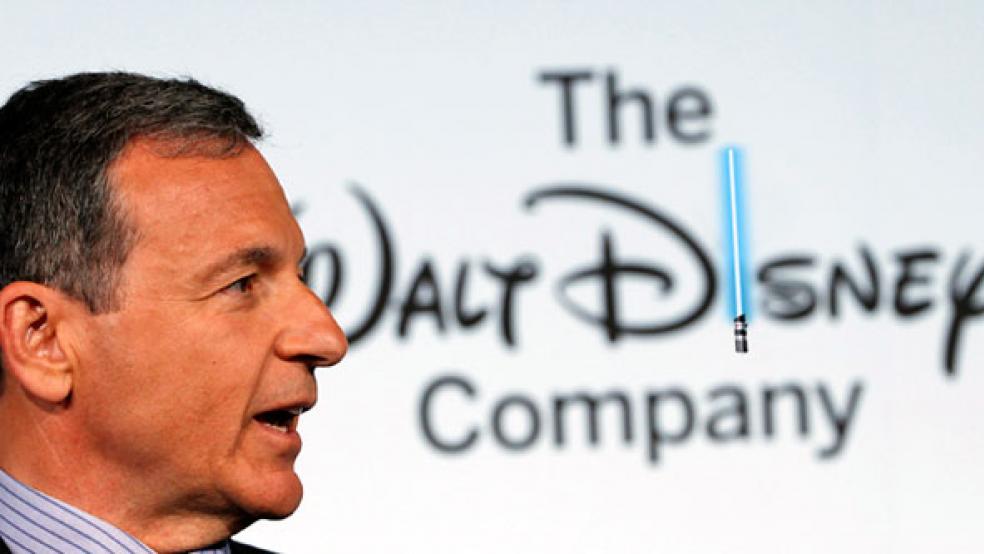Hollywood briefly grabbed the spotlight from the storm-ravaged East Coast this week with the announcement by Walt Disney Co. (DIS) that it would pay an eye-popping $4.05 billion to acquire the “Star Wars” franchise from its director, George Lucas, along with the rest of his company, LucasFilm.
Clearly, Disney is willing to bet heavily that the next film in that “Star Wars” family, scheduled to be released in 2015, will be a hit; so far, the franchise has pulled in nearly $4.5 billion in global ticket sales. And the Disney executives pointed out on the conference call convened to discuss the deal that more “Star Wars” films – and the products tied to them – are in the pipeline. (The deal doesn’t include the rights to develop new films based on other LucasFilm properties, such as Indiana Jones.)
RELATED: What Will Disney Do with ‘Star Wars’? 5 Theories
Equally obvious, however, is that investors weren’t overly enamored of the deal or its terms; Disney’s stock price slipped 2 percent on Wednesday before gaining back 1.3 percent on Thursday. It’s a costly purchase for Disney, exceeded only by the entertainment conglomerate’s $7.6 billion acquisition of Pixar (which also had its roots in Lucas’s film company) in 2006. And it raises questions about how Disney execs will set about managing what increasingly seems more like a stable of brands than a film studio.
When those brands include everything from Buzz Lightyear (Pixar) to a wide array of comic book superheroes (thanks to the $4 billion purchase of Marvel Studios, home to “The Avengers” and “Captain America”), optimists may shrug and say, so what? Moreover, Disney has pacts to distribute content from producer Jerry Bruckheimer (his “The Lone Ranger” will ride into movie theaters worldwide next year) and DreamWorks Animation, home to Shrek and the critters from “Madagascar.”
The slight net drop in Disney shares over the past two days is more likely due to sticker shock than to serious doubts about the company’s ability to keep the “Star Wars” franchise chugging along. Or perhaps it’s because the company projects the purchase, half of which will be paid for in newly issued stock, will dilute earnings per share in 2013 and 2014. Still, this is the media empire constructed around an 84-year-old animated mouse with a squeaky voice who, after a makeover in recent years, is still attracting legions of new fans. And Disney’s success with Marvel shows it knows how to generate global interest in such fantasy worlds.
Before the deal was announced, Disney shareholders had been able to rejoice in the astonishing 40 percent surge in the value of their holdings, and even some isolated muttering by analysts worried about lofty valuations. The company’s quarterly earnings have grown at a year-over-year rate of nearly 75 percent in the last 12 months. Moreover, the valuation continues to hover only just above that of the S&P 500 (at about 16 times trailing earnings) and it offers a dividend yield of 1.22 percent.
There are some valid concerns about what lies ahead for some movie industry franchises, but the company to worry about is more likely DreamWorks (DWA) – whose quarterly earnings, on a year-over-year basis, have been unimpressive compared to those at Disney. And yet DreamWorks also has seen its stock outperform the S&P 500 index, having rallied 23.4 percent since the beginning of the year, and now trading at a premium valuation of more than 26 times trailing 12-month earnings. True, “Madagascar 3” has done well at the box office, but to sustain that kind of valuation, DreamWorks needs to be able to persuade families that it’s worthwhile spending nearly twice as much to take their kids to see films in 3-D – increasingly important to the company’s business strategy.
As long as the global economy remains uncertain, the odds are that those families will prefer to save their still-scarce savings to be able to take their 8-year-olds to a second movie (perhaps a Pixar title, or a Disney production, or a Marvel feature) than on tickets to a high-end event. Or even to hang on to any cash they have saved and putting it toward a trip to a Disney theme park, where occupancy rates and margins have been on the upswing.
Disney’s shares may be richly priced at their current levels, but the company has shown its ability to keep venerable – even ancient – franchises alive and flourishing, and there seems little reason to bet that they can’t do the same with the “Star Wars” family, which fits neatly into the company’s existing array of products. Even if you don’t feel like snapping up stock at current prices, unless you believe that Disney’s management are losing their touch, you probably won’t want to bet against the company’s shares, either. After all, The Force is now with CEO Robert Iger and his colleagues.






